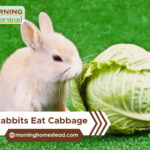Last Updated on May 8, 2023 by Georgie Smith
People associate rabbits with leafy vegetables, especially lettuce. The most popular rabbit, Bugs Bunny, rarely appears without a carrot hanging from his mouth or talking about food. Rabbits tend to be one of the healthiest animals due to the amount of healthy, fresh vegetables they consume.
What about cucumbers? Have you tried to feed your rabbit cucumbers and if so, did she like the veggie? Rabbits are an animal that everyone associates with vegetables. However, can rabbits eat cucumber, and is it a safe food?
In this article, we will talk about whether cucumbers are a rabbit’s friend or foe. We all know vegetables are great, but, there are some that can hurt rabbits more than help. Are cucumbers on that list?
Can Rabbits Eat Cucumber?
Yes, rabbits can have cucumbers as part of their balanced diet. Not only do they enjoy eating the food, but it also has a healthy dose of nutritional value that rabbits need. Domestic rabbits should have at least three different veggies on their daily menu. Can a cucumber safely be on that list as a rotation addition?
Yes! Cucumbers are indeed very safe, and good for rabbits to consume. The cucumber that you commercially harvest (like the ones in your garden) is a healthy choice as long as it is free of fertilizers and pesticides.
Some chemical sprays and fertilizers are toxic to rabbits. For that reason, it is best only to feed organic cucumbers to your domestic bunnies. One other step to take is to rinse the cucumbers under cold water while scrubbing the peeling before feeding your rabbit.
Additionally, wild cucumbers that you find randomly growing are not safe for bunnies. These types are highly toxic to rabbits as well as other small animals. [1]
Healthy Info About Cucumbers
Cucumbers are a natural “cool” vegetable. That may sound weird about a food item, but when it comes to these veggies, they genuinely are cool. The internal temperature remains around 20 degrees cooler than the outside temperature.
Cucumbers are also an excellent addition to a human’s healthy diet as they are 96 percent solid water. Have you ever noticed how soft the skin is on a cucumber? That skin is what keeps the water inside and at quality levels.
An important substance found in cucumbers are silica. Silica is vital for connective tissue such as bone, cartilage, ligaments, and tendons to remain healthy. Professionals recommend it for improving complexion and skin health.
Due to its high level of water content, cucumbers supply natural hydrations, which give the skin a healthy glow.
Rabbits and Cucumbers, Safe or No?
Yes- Cucumbers are a fun and healthy food as a snack for your rabbit. However, as a snack is all you should choose to feed her as it can be rough on the digestive tract if overfed. Runny stools (often called rabbit diarrhea) along with a poor appetite could be the result.
As for as a nutritionally dense food, the cucumber lacks in that section. Meaning, for the nutrients that your rabbit needs, you won’t find much in this tasty treat.
One other vegetable that has a high-water content is iceberg lettuce. Both of these foods need to be fed in moderation to prevent painful runny stools. Feeding your pet an occasional treat is fine as long as it is in small amounts.
Also, if you notice signs of diarrhea and gas, do not feed her cucumber again. Some veggies even after the animal has eaten them all along, begin to cause digestive issues. That is due to the lining of their stomach weakening after a period of damage. Other vegetables are better for your rabbit that she will love.
Less is Better
As mentioned above, cucumbers and other foods sprayed with chemicals to kill pests and promote growth work effectively. However, it is also highly toxic to rabbits. The only reason organic cucumbers are bad for rabbits is if they eat excessive amounts or are introduced into their diet too quickly.
If you feed your bunny too many water-rich veggies, such as cucumbers and iceberg lettuce, it can cause your rabbit to have issues. The same will happen if you fail to introduce it to your pet in a slow manner. The repercussion of this is your rabbit could have soft cecotropes.
Cecotropes are a nutrient-rich matter that consists of food particles partially digested that produced in the small animal’s digestive tract known as the cecum. Rabbits defecate the cecotropes; then they ingest them to get the nutrients remaining from the food they failed to get from eating.
The Cecotropes are a vital part of your rabbit’s diet because of the vitamin B nutrient content that a rabbit cannot produce solely. Therefore, if it fails to ingest the loose cecotropes, trouble awaits for the bunny.
Once you give your rabbit cucumber, make sure it is thin slices only every few days. After that, you can increase the amounts gradually over periods of weeks. Never feed her more than two or three small slices at one time.
FAQs:
Q: Can a rabbit eat the peeling of a cucumber?
A: Yes, the rabbit can eat the peel. Actually, the peeling is where a lot of the nutrients are making it an excellent healthy snack.
Q: Is cucumber actually good for rabbits?
A: Like most fresh veggies, cucumbers primarily are water. 95 percent water to be exact. On hot summer days, these type of foods is perfect for a rabbit for hydration. It is also low calorie making it an all-around good food when fed in moderation.
Conclusion
Cucumbers like so many vegetables are extra safe for rabbits, and it is a tasty treat as well. Wild bunnies especially enjoy eating cucumbers on hot summer days. Be sure always to clean this food and any other fruit and vegetable well to remove toxins that can harm your pets.
Remember that although cucumbers and foliage are healthy and rabbits can eat it, they have high water levels which can harm your rabbit’s tummy. Be sure to always add the proper amount of hay into your rabbit’s diet while moderately feeding fruits and veggies.
As always Morning Homestead remains a leader for supplying a product guide on items you use around your home, in the garden and even farm life. If you need information on a product, let us know, and we will be thrilled to deliver precisely what you need.
Other sites offer guides but not one that provides more truth than what we do as a team. We stand at a vantage point to delivery oven-fresh and first-class articles for our readers. You can count on us because we always go above and beyond to surpass your expectation.
We thank you sincerely that you spent part of your valuable time to read this post. We love to hear from you, so do not forget to drop your comments below to get a conversation started. There is love in sharing, so share this post across all social networks for others to benefit too. Thank you!




![What To Feed Baby Rabbits 2-3 Weeks Old? [Orphaned Baby Bunnies] What-Feed-Baby-Rabbits-2-3-Weeks-Old](https://morninghomestead.com/wp-content/uploads/2019/06/What-Feed-Baby-Rabbits-2-3-Weeks-Old-150x150.jpg)
